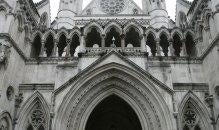
The “Reynolds” defence of “responsible journalism” in libel cases can extend beyond newspapers to books and other media, the Court of Appeal ruled today in a groundbreaking judgment.
Three judges dismissed a claim for damages brought by ex-police officer Michael Charman against journalist Graeme McLagan and Orion, the publishers of his book, “Bent Coppers – The Inside Story Of Scotland Yard’s Battle Against Police Corruption.”
The Police Federation, which backed Charman, now faces a costs bill unofficially estimated at more than £1 million, with £400,000 to be paid on account within 28 days.
Charman claimed the book libelled him by suggesting that there were “cogent grounds” of suspecting him of being involved in corruption.
McLagan and Orion had relied on the “Reynolds” defence of qualified privilege, which was upheld in the House of Lords in 1998, and protects a publication if it is in the public interest and satisfies the test of responsible journalism.
Allowing their appeal against a High Court ruling, in July 2006, which dismissed the qualified privilege defence, Lord Justice Ward, sitting with Lord Justice Sedley and Lord Justice Hooper, said that he was “totally satisfied” that the book was a piece of responsible journalism.
They found that McLagan had taken steps to verify the story and that as a result of his honesty, his expertise on the subject, his careful research and his painstaking evaluation of a mass of material, the book was protected.
It was the first time that the Reynolds defence had succeeded in the publication of a book.
McLagan’s solicitor, Caroline Kean, said that the ruling was “ground-breaking” and a “momentous victory”.
“There was a lot of doubt whether the courts below would actually implement Reynolds and this is an unambiguous confirmation by the Court of Appeal that Reynolds is alive and kicking.
“It is not limited to newspapers, it means all media and there is no time constraint.
“It applies equally to a book and, by analogy, it will apply to a film or a TV programme, providing it is something of proper public interest and a journalist has done his very best to act in the course of responsible journalism.”
“The court has also said that you don’t have to be completely neutral to have responsible journalism. You can form an opinion providing that there is balance over all.”
McLagan, who is in the USA, commented that it was “a victory for solid, responsible investigative journalism”.
Peter Roche, chief executive officer of The Orion Publishing Group, said: “This judgment will enable serious investigative works covering matters of public concern to be published in future and increase the freedom of debate in the UK.”
Email pged@pressgazette.co.uk to point out mistakes, provide story tips or send in a letter for publication on our "Letters Page" blog

